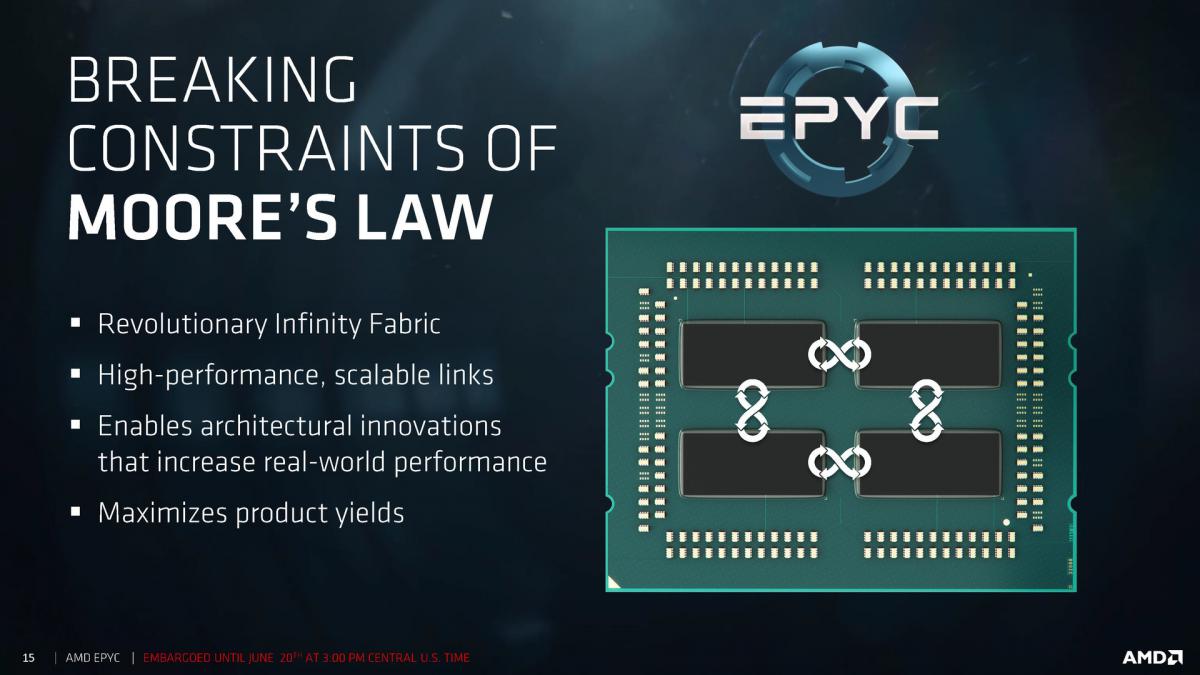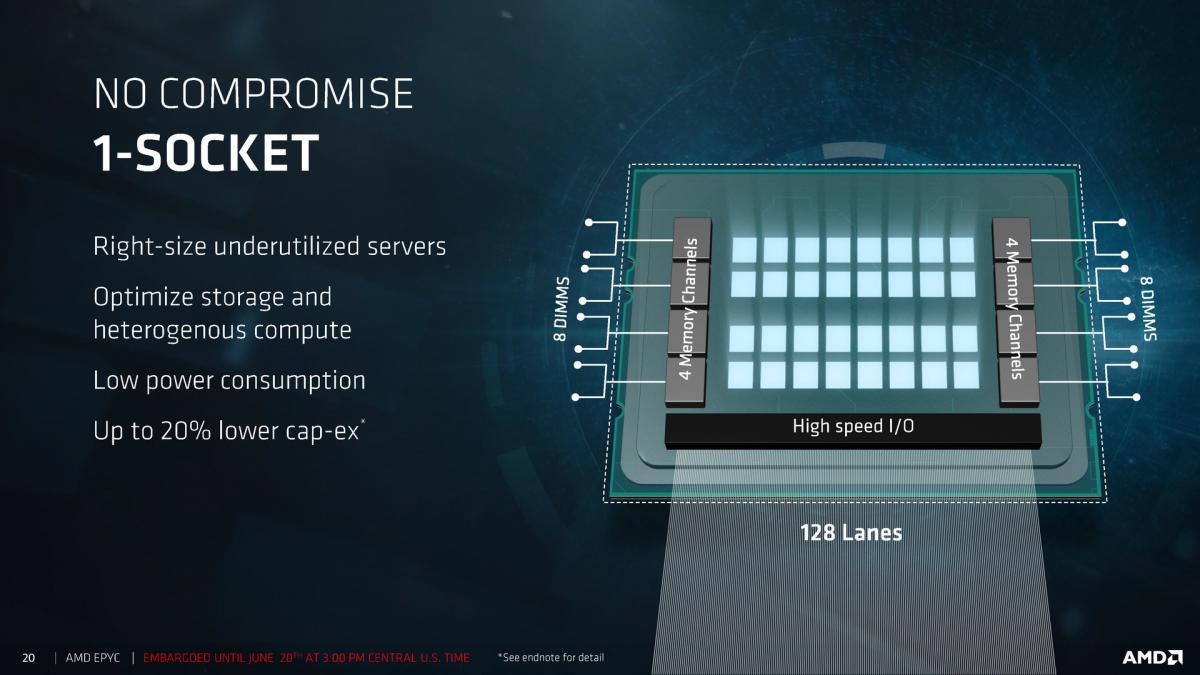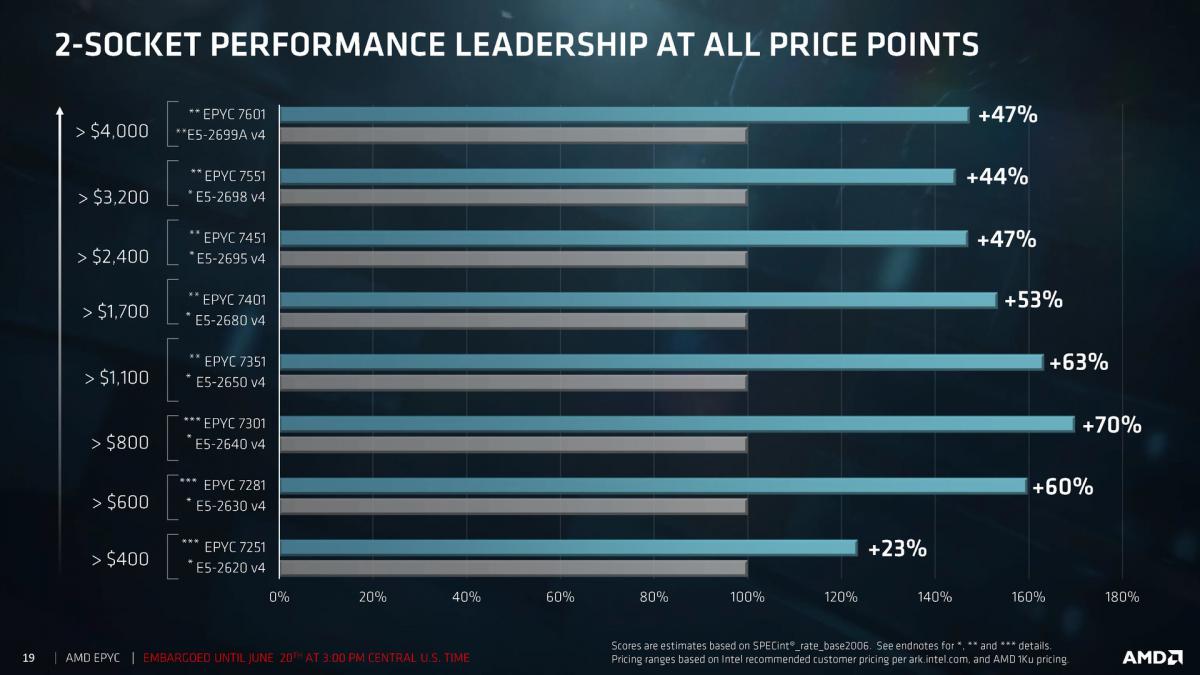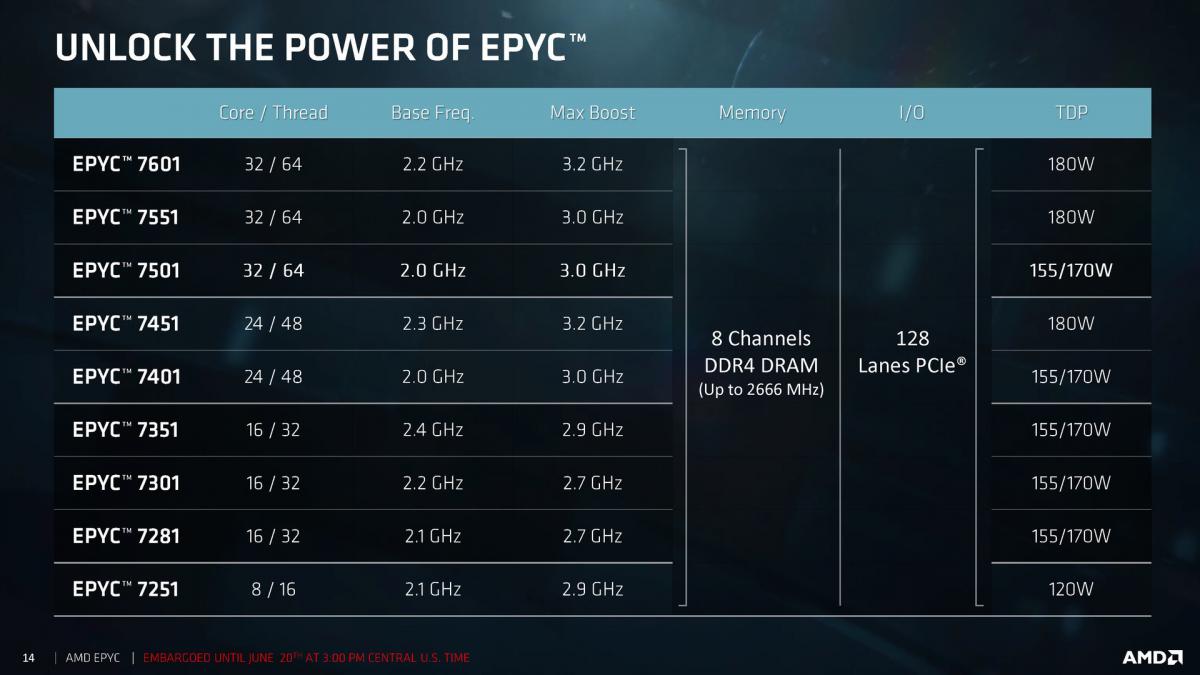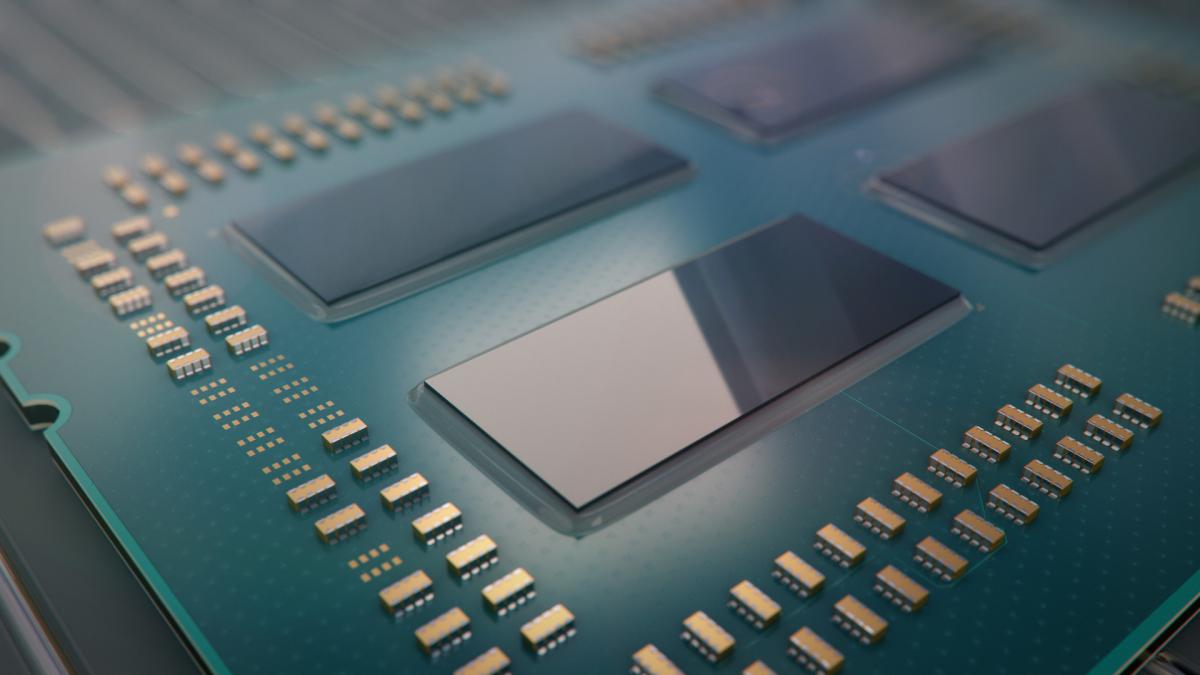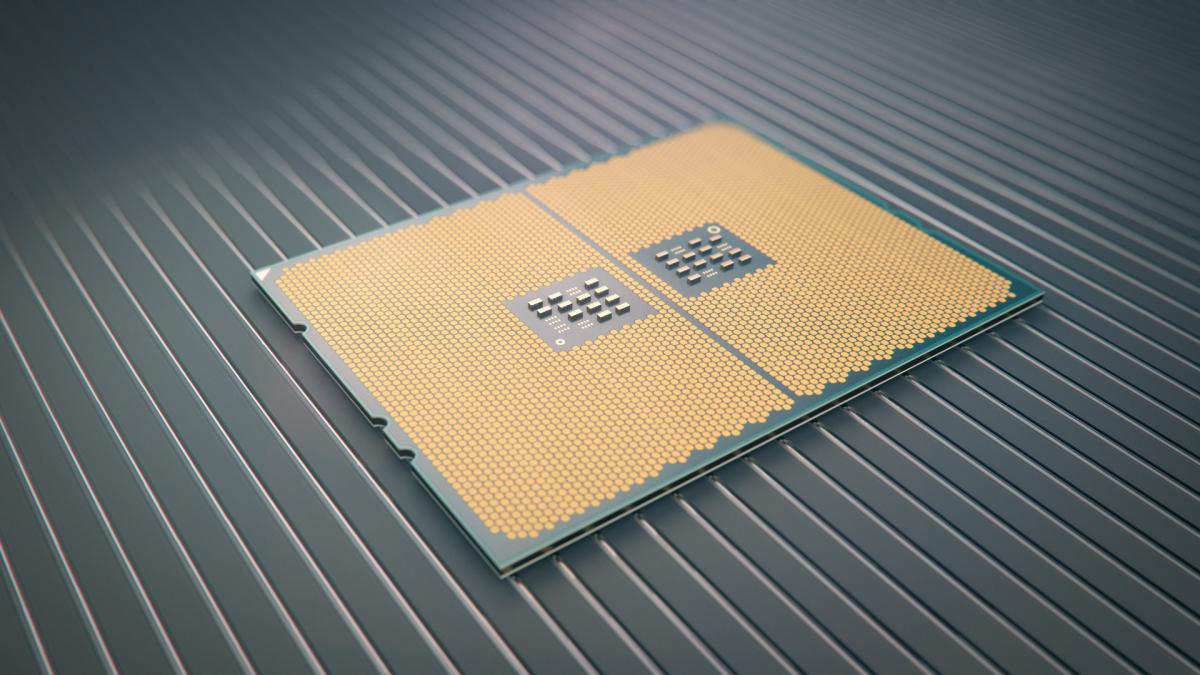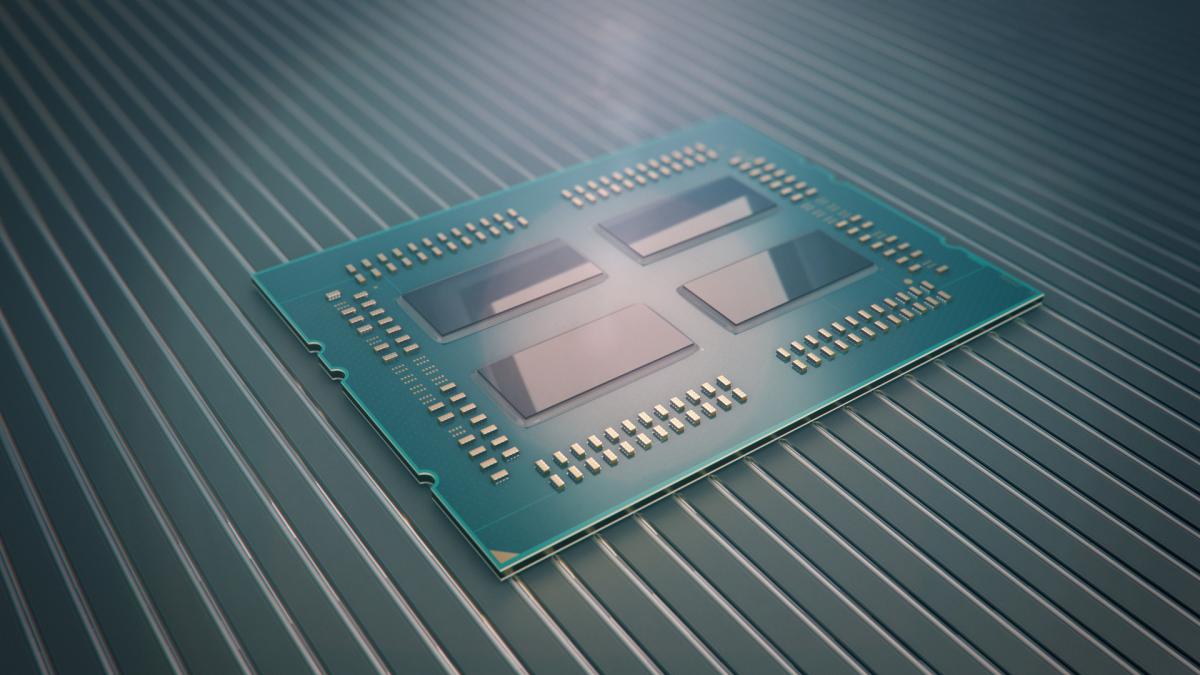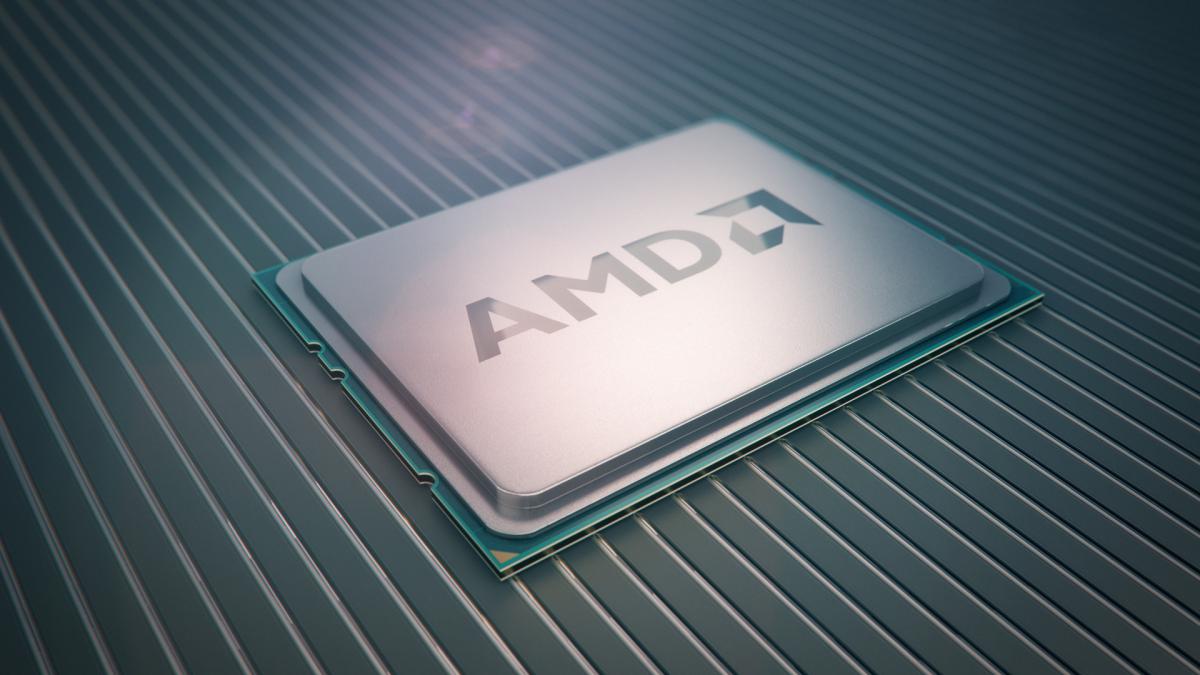AMD launched the EPYC 7000 series of high-performance datacenter processors. AMD EPYC processors get up to 32 cores and 64 threads on a single socket (1P) and on dual-socket (2P) server platforms - that would be 64 cores and 128 threads. Each EPYC processor has 128 PCIe Gen 3 lanes for I/O.
AMD came up with a new architecture and designed a 32-core processors, Epyc. AMD EPYC processors get up to 32 cores and 64 threads on a single socket (1P) and on dual-socket (2P) server platforms - that would be 64 cores and 128 threads. Each EPYC processor has 128 PCIe Gen 3 lanes for I/O. 128 PCIe lanes mean that you can have 8 x16 links available.
The Epyx processors are based on a Multi-Chip Module (MCM) design so more of the same dies into one package. This means a full processor has four CPU Complexes (CCX) that are built over AMD’s Infinity Fabric for low low latency within this architecture. The CPU has 64MB of L3 cache which is 16-way associative. Each core can acces the L3 buffers.
EPYC processors comes with whopping 8-channel DDR4 memory support, each socket supports 16 DIMMS of 2400MHz DDR4 memory. Each CCX has two channels of memory connected to them and at 2667MHz you are looking at 21.3 GB/s of memory bandwidth per channel or 171 GB/s of memory bandwidth per socket. EPYC processor supports upto 2TB of memory.
AMD releases no less than nine EPYC 7000 series processors in the coming weeks and will offer 8, 16, 24 and 32 core procs with speeds boosting up to 3.2GHz and a TDP of 180 Watts. AMD will fisrt release the upp-er segment CPUs being the 24- and 32-core processors, and then will follow by releasing the 8- and 16-core processors by the end of July 2017. With one a single EPYC socket CPU delivering up to 32 cores, 2 TB of DDR4 memory and 128 PCI Express lanes it looks like AMD in full frotnal attack at Intel.
AMD EPYC 7000 Series Server Lineup:
| CPU Name | CPU Cores | CPU Threads | L3 Cache | Base Clock | Boost Clock | TDP | Pricing Range |
|---|---|---|---|---|---|---|---|
| EPYC 7601 | 32 | 64 | 64 MB | 2.2 GHz | 3.2 GHz | 180W | >$4,000 USD |
| EPYC 7551 | 32 | 64 | 64 MB | 2.0 GHz | 3.0 GHz | 180W | >$3,200 USD |
| EPYC 7501 | 32 | 64 | 64 MB | 2.0 GHz | 3.0 GHz | 155/170W | >$2,700 USD |
| EPYC 7451 | 24 | 48 | 48 MB | 2.3 GHz | 3.2 GHz | 180W | >$2,400 USD |
| EPYC 7401 | 24 | 48 | 48 MB | 2.0 GHz | 3.0 GHz | 155/170W | >$1,700 USD |
| EPYC 7351 | 16 | 32 | 32 MB | 2.4 GHz | 2.9 GHz | 155/170W | >$1,100 USD |
| EPYC 7301 | 16 | 32 | 32 MB | 2.2 GHz | 2.7 GHz | 155/170W | >$800 USD |
| EPYC 7281 | 16 | 32 | 32 MB | 2.1 GHz | 2.7 GHz | 155/170W | >$600 USD |
| EPYC 7251 | 8 | 16 | 16 MB | 2.1 GHz | 2.9 GHz | 120W | >$400 USD |
There are three processors that can be used in a single CPU configuration only:
| CPU Name | CPU Cores | CPU Threads | L3 Cache | Base Clock | Boost Clock | TDP | Pricing Range |
|---|---|---|---|---|---|---|---|
| EPYC 7551P | 32 | 64 | 64 MB | 2.0 GHz | 3.0 GHz | 180W | >2000 USD |
| EPYC 7401P | 24 | 48 | 48 MB | 2.0 GHz | 3.0 GHz | 155/170W | >1000 USD |
| EPYC 7351P | 16 | 32 | 32 MB | 2.4 GHz | 2.9 GHz | 155/170W | >700 USD |
AMD launched the EPYC 7000 series of high-performance datacenter processors. With up to 32 high-performance “Zen” cores and an unparalleled feature set, the record-setting AMD EPYC design delivers greater performance across a full range of integer, floating point, memory bandwidth, and I/O benchmarks and workloads.
AMD, along with its global ecosystem of server customers and partners, launched the EPYC 7000 series of high-performance datacenter processors. With up to 32 high-performance “Zen” cores and an unparalleled feature set, the record-setting AMD EPYC design delivers greater performance across a full range of integer, floating point, memory bandwidth, and I/O benchmarks and workloads.
AMD was joined by multiple customers and partners at the global launch event in presenting a wide array of systems, performance demonstrations, and customer testimonials. The innovative, record-setting AMD EPYC design, with up to 32 high-performance “Zen” cores and an unparalleled feature set, delivers greater performance than the competition across a full range of integer, floating point, memory bandwidth, and I/O benchmarks and workloads.
“With our EPYC family of processors, AMD is delivering industry-leading performance on critical enterprise, cloud, and machine intelligence workloads,” said Lisa Su, president and CEO, AMD. “EPYC processors offer uncompromising performance for single-socket systems while scaling dual-socket server performance to new heights, outperforming the competition at every price point. We are proud to bring choice and innovation back to the datacenter with the strong support of our global ecosystem partners.”
The world’s largest server manufacturers introduced products based on AMD EPYC 7000-series processors at today’s launch, including HPE, Dell, Asus, Gigabyte, Inventec, Lenovo, Sugon, Supermicro, Tyan, and Wistron. Primary hypervisor and server operating system providers Microsoft, Red Hat, and VMware showcased optimized support for EPYC, while key server hardware ecosystem partners Mellanox, Samsung Electronics, and Xilinx were also featured in EPYC-optimized platforms.
Leading Server OEM Platforms
“The EPYC processor represents a paradigm shift in computing and will usher in a new era for the IT ecosystem,” said Antonio Neri, EVP and general manager Enterprise Group, HPE. “Starting with the Cloudline CL3150 and expanding into other product lines later this year, the arrival of EPYC in HPE systems will be welcomed by customers who are eager to deploy the performance and innovation EPYC delivers.”
“As an industry leader, we are committed to driving IT Transformation for our customers,” said Ashley Gorakhpurwalla, president, server solutions division at Dell EMC, “Our next generation of PowerEdge servers are the bedrock of the modern data center that are designed to maximize business scalability and intelligent automation with integrated security. The combination of PowerEdge and the AMD EPYC performance and security capabilities will create unique compute solutions for our customers to accelerate workloads and protect their business.”
Cloud Datacenter and Enterprise Customers
Datacenter and cloud service providers also welcomed EPYC to the market today. Members of the “Super 7” datacenter services providers, including Baidu and Microsoft Azure, as well as 1&1, Bloomberg, Dropbox and LexisNexis, all voiced their support at launch.
“As the world’s largest Chinese language search engine and leading AI-Tech company, Baidu prides itself on simplifying a complex world through technology,” said By Dr. Zhang Ya Qin, president of Baidu. “The AMD EPYC processor powered one-socket server can significantly increase our datacenter computing efficiency, reduce TCO and lower energy consumption. We will start deploying with the launch of AMD EPYC and I look forward to our cooperation leading to scaled EPYC adoption this year, and ongoing innovations.”
“We’ve worked to make Microsoft Azure a powerful enterprise grade cloud platform, that helps guide the success of our customers, no matter their size or geography,” said Girish Bablani, corporate vice president, Azure Compute, Microsoft Corp. “To power Azure, we require the most cutting-edge infrastructure and the latest advances in silicon which is why we intend to be the first global cloud provider to deliver AMD EPYC, and its combination of high performance and value, to customers.
Record-Setting EPYC Performance
The excitement around EPYC is driven by multiple record-setting server benchmarks achieved by EPYC-powered one-socket and two-socket systems.
AMD EPYC processors set several performance records, including:
- Two-Socket Server
- AMD EPYC 7601-based system scored 2360 on SPECint®_rate2006, higher than any other two-socket system score1
- One-Socket Server
- AMD EPYC™ 7601-based system scored 1200 on SPECint®_rate2006, higher than any other mainstream one-socket x86-based system score2
- AMD EPYC 7601-based system scored 943 on SPECfp®_rate2006, higher than any other one-socket system score3
All EPYC processors combine innovative security features, enterprise class reliability, and support a full feature-set. An AMD EPYC™ 7601 CPU-based one-socket system shifts expectations for single socket server performance, helping lower total-cost-of-ownership (TCO), providing up to 20% CapEx savings compared to the Intel Xeon E5-2660 v4-based two-socket system4. At every targeted price point for two-socket processors, EPYC outperforms the competition, with up to 70% more performance in the eight hundred dollar price band and up to 47% more performance at the high-end of the market of four thousand dollars or more5.
EPYC Product Overview
- A highly scalable System on Chip (SoC) design ranging from 8-core to 32-core, supporting two high-performance threads per core.
- Industry-leading memory bandwidth across the line-up, with 8 channels of memory on every EPYC device. In a two-socket server, support for up to 32 DIMMS of DDR4 on 16 memory channels, delivering up to 4 terabytes of total memory capacity.
- Unprecedented support for integrated, high-speed I/O with 128 lanes of PCIe® 3 on every product
- A highly-optimized cache structure for high-performance, energy efficient compute
- AMD Infinity Fabric coherent interconnect linking EPYC CPUs in a two-socket system
- Dedicated security hardware
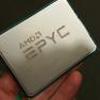
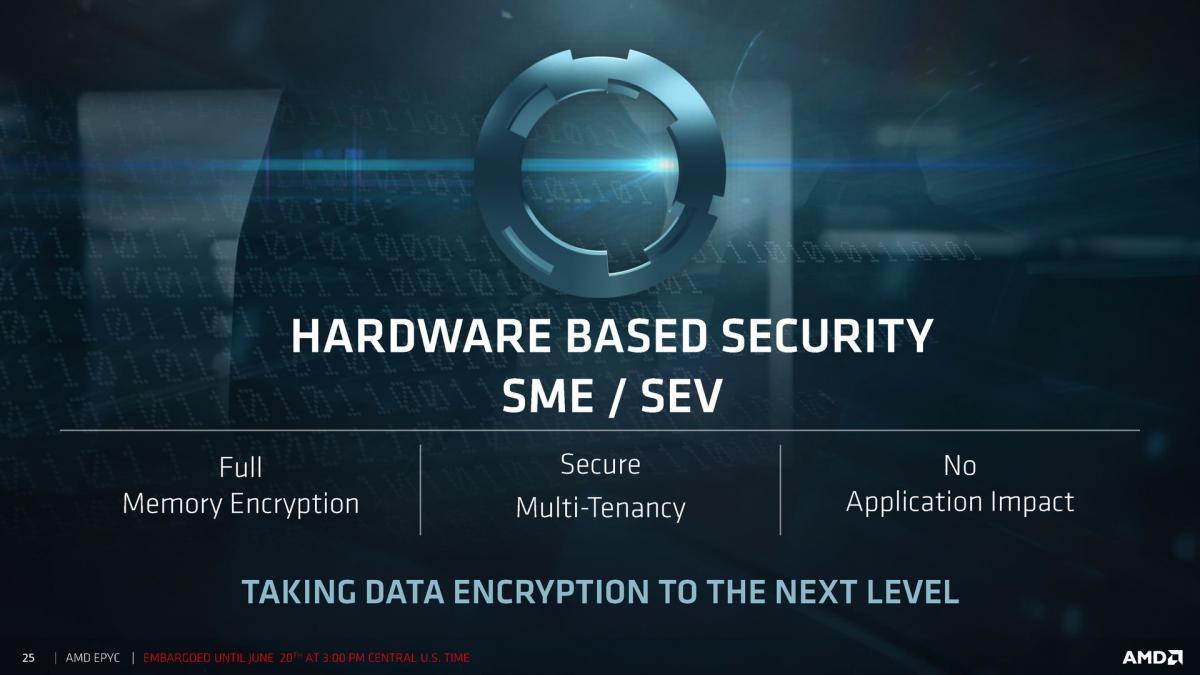
.jpg)
